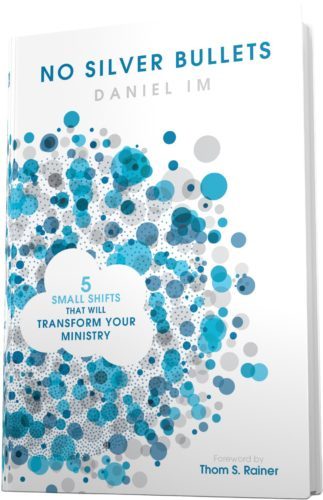Daniel Im's Blog, page 17
September 26, 2017
What Kind of Church Leader Are You?

In order to grow and multiply your church, you have to start with yourself.
I’m not talking about picking up a self-help book to learn how to get your best life now. I’m talking about figuring out why it is that you lead the way that you do.
But Daniel, that means I need to slow down and reflect…I don’t have time for that! Sunday’s coming, and I need to…
Yes I understand that Sunday is coming and that you have things to do! But here’s the thing…
If you don’t take the necessary time to learn why you lead the way you lead, disciple the way you disciple, and teach the way you teach, you will never be able to grow and multiply your church.
In order to grow and multiply your church, you have to start with yourself.
Click To Tweet
In my book, No Silver Bullets: Five Small Shifts that will Transform Your Ministry, I start the first chapter with a self-assessment to help you discover why it is that you lead the way you do.
Here’s a portion of it. I hope you’ll slow down and take a moment to work through each of these questions:
1. Who do you look up to as a pastor and church leader?
Who has shaped your view of church practice and practical theology? Is it Eugene Peterson? J. I. Packer? Tim Keller? It could be someone you know personally, or someone you’ve admired from a distance.
The people you look up to hold the greatest power to shape you.
In other words, the ones you follow are the ones you model. Write down the names of the pastors, missionaries, theologians, leaders, and thinkers that have shaped you most.
The people you look up to hold the greatest power to shape you.
Click To Tweet
2. How have others shaped you?
How have the individuals above shaped the way you approach church practice and practical theology? Is it the way you preach? Or the way you approach discipleship? Perhaps it’s the way you cast vision, or your view of church planting, multisite, and multiplication?
Write down the ways that your church practice and practical theology have been shaped by the previous list of individuals.
3. What type of leader are you?
Let me paraphrase one of my favorite quotes from the Chinese general, military strategist, and author of The Art of War, Sun Tzu:
If you know your enemy, you’ll win half of the battles. But if you know yourself, you’ll win the other half.
We too often model our ministries after the ones we follow—sometimes intentionally and other times unintentionally. As a result, their influence on us inevitably leaves a mark on the way we view and do ministry.
This is not a bad thing per se, but it has the potential to turn into a bad habit if left unchecked.
So going back to Sun Tzu’s wisdom on war—are you only winning half of your battles? Do you know what type of leader you are? Are you more task-oriented or people-oriented? Do you like solving problems or finding solutions? Do you like starting things, improving them, or maintaining them? Do you know your strengths? Are you managing your weaknesses? Do you like to do everything, or do you develop, delegate, or dump?
Take a few personality profiles and write out your results (I recommend StrengthsFinder, Kolbe, and any of the numerous versions of DISC, just to name a few).
4. How do you view accountability?
Is it your direct responsibility to grow those in your church as disciples? Or rather, is it your responsibility to create an environment in which they can grow? Do you have someone that holds you accountable as a leader?
These questions are important because your view of accountability from a systems perspective directly influences the way your church measures growth (this is what I cover in chapter 1-2 of No Silver Bullets).
The ones you follow are the ones you model.
Click To Tweet
Take the time to work through each of these questions.
Next week, I will address the other aspect of leadership that we often neglect—staff and team development.
September 19, 2017
The Obscure Link Between Instant Gratification and Change

Do you remember when it would take so long for your computer to start up, that you’d have time to brew a cup of coffee or make yourself a sandwich?
Oh how times have changed…
If we want to read a book, we can download it instantly. If we want to listen to one, we can literally press play the moment after we purchase it. If we want toothpaste, laundry detergent, or a few bananas, we can order it on Prime Now and get it within two hours. And now, with the launch of Amazon Go, we don’t even need to line up and pay the cashier at the grocery store!
Sure, this is convenient, but the unfortunate side effect is that we’ve been conditioned to need, want, and long for change.
We’re addicted to change…and secretly we love it.
Now change isn’t a bad thing in and of itself, but change for the sake of change must be avoided. It demoralizes your team, causes unnecessary stress, and is simply unproductive. However, if you have decided that change needs to take place in your life and in your ministry, following this eight-step process that I wrote about in a previous article, is critical.
Change for the sake of change must be avoided at all costs.
Click To Tweet
Now while the likelihood of succeeding in leading change without the eight-step process—or some variation of it—is pretty low, how you view and approach change matters even more.
When burdened with a new idea, or a desire to change something specifically in your life or your church, definitely start with prayer. But don’t move straight to implementation after you say “Amen.”
We need to slow down and take a different approach.
Now I understand that this is hard to do because of our on-demand, stream-anytime, find-an-answer-to-anything, go-anywhere, and swipe-now-pay-later instant gratification culture.
In fact, it’s because of this that we often misinterpret a conviction from God as permission to drop everything and engage it, rather than waiting on him for our next steps. However, unless we introduce change in a fundamentally different manner than we are doing now, these eight-steps will not work.
While it’s pretty easy to follow these eight-steps for change, since they are easy to understand, systematic, and proven…
…when introducing change, I’m convinced there should be always be a sticker that says: “Buyers beware: You will have to live with the change once it’s implemented.”
Buyers beware: You will have to live with the change once it’s implemented.
Click To Tweet
Are you prepared for that?
Or will you change your mind and introduce change that reverses the effects of your original change initiative after a couple of months?
Unless your change effort leads you closer to the vision, strategy, and values that God is calling your church to embrace, you’re wasting your time. You’re introducing change that will merely be overturned at a later time. You are allowing yourself to settle with mediocrity. After all, isn’t good the enemy of great?
Learn about the three steps for introducing change in chapter 6 of No Silver Bullets: Five Small Shifts that will Transform Your Ministry.
*This was a modified excerpt from my book, No Silver Bullets: Five Small Shifts that will Transform Your Ministry.
September 12, 2017
Systems and an Encyclopedia
 As a child, I remember flipping through the human anatomy section in the Encyclopedia Britannica.
As a child, I remember flipping through the human anatomy section in the Encyclopedia Britannica.As a curious child with an insatiable love for learning—I remember times when I would just open up the encyclopedia and read. My favorite section was the human anatomy, since I wanted to be a doctor. In fact, I vividly remember looking through and being amazed by the layers of complexity that the human body presented.
This section was always several pages long.
In fact, it always stuck out from the other pages in the encyclopedia, since each system in the human body was printed on its own plastic, transparent page.
If you had one of these old-school encyclopedias in front of you, the first system you’d see would be the integumentary system—the body’s outer covering. In other words, you’d see a naked human body with skin, hair, and nails. If you flipped that transparent page over to the next—I apologize for the graphic nature of this next phrase—it would almost be like you were peeling the skin off of a human. You’d be left with the muscular system. If you flipped that page over again, you would see the circulatory system.
With every progressive page turn, you would uncover another system that makes up the human body. The nervous system, the lymphatic system, the skeletal system, and so on.
Just like there are different layers of systems in the human body, so it is with the church.
The systems in your church are designed to work together, like they do in the human body, to help your church function as God intends it to. After all, “God has arranged each one of the parts in the body just as he wanted” (1 Cor. 12:18).
So what exactly are those systems for your church?
While there are many more than just these two, your discipleship pathway and leadership pipeline are what makes up the two core systems that drive everything in your church.
Your discipleship pathway & leadership pipeline are the two core systems that drive everything.
Click To Tweet
Here’s a quick comparison of the two and how they relate with one another:
Your discipleship pathway will form your church into missionary disciples, while your leadership pipeline will equip your church to live as missionary disciples
Your discipleship pathway will shape your people’s character, while your leadership pipeline will develop their competencies
Your discipleship pathway will transform hearts, while your leadership pipeline will train transforming agents
Your discipleship pathway will develop, while your leadership pipeline will deploy.
Using an analogy, if your church were a car that had to get to a particular endpoint, which would be the vision, the discipleship pathway would be the fuel, and the leadership pipeline would be the engine.
Both are equally important and have to rely on each other if the car is going to experience any movement.
Your discipleship pathway will develop, while your leadership pipeline will deploy.
Click To Tweet
My book, No Silver Bullets , will help you build and develop a discipleship pathway from scratch.
Now if the necessary systems are already set up in your church, but you aren’t quite sure they are the right ones or if they’re performing at full capacity, then I will help you clarify and tweak them, so that your ministry is unleashed toward greater Kingdom impact.
Learn more by watching the video below and picking up a copy of the book today.
*This was a modified excerpt from my book, No Silver Bullets: Five Small Shifts that will Transform Your Ministry.
September 5, 2017
The 5 Small Shifts
 Are you happy with your existing vision, strategy, and values? Are you producing disciple-makers, disciples, or consumers? Are you worried that what you’re currently doing isn’t sustainable or scalable? Do you need to overhaul your church, but aren’t sure how?
Are you happy with your existing vision, strategy, and values? Are you producing disciple-makers, disciples, or consumers? Are you worried that what you’re currently doing isn’t sustainable or scalable? Do you need to overhaul your church, but aren’t sure how?
I want to invite you to consider what God might do through you, if you were to implement five small shifts.
In my book, No Silver Bullets: Five Small Shifts that will Transform Your Ministry, you’ll discover five micro-shifts that have the potential to produce macro-change in your church. Here’s a quick overview.
Shift #1: From Destination to Direction
This first shift is about viewing discipleship from a systems perspective. In this shift, you’ll uncover the various ways churches approach discipleship from a fifty-thousand-foot level. We’ll do this by looking at the two spectrums that influence your approach, and then by examining how they intersect.
Shift #2: From Output to Input
In this second shift, you’ll zoom into discipleship at the individual level. We’ll go from looking at the systematic discipleship of the many to the personal discipleship of the one. We’ll do this by unpacking the results of one of the largest research projects on discipleship to date, in order to determine the right metrics for maturity.
Shift #3: From Sage to Guide
Technology has forever changed the way individuals learn. Moreover, adults learn differently than children. We simply can’t teach the way we were taught. In this shift, we’ll unpack these issues and you’ll explore what it looks like to move from being a sage on the stage to a guide on the side when it comes to discipleship and leadership development.
Shift #4: From Form to Function
In the New Testament, we read more about the function of ministry, which is to be in community, than any particular form or model of ministry. As a result, in this shift, we’ll survey four environments where discipleship and development occur. This will help you uncover and adopt a kingdom vision for community, rather than a whatever-works-for-the-successful-church-down-the-road model.
Shift #5: From Maturity to Missionary
How do you define the church? Through the lens of God’s mission or your mission? In this shift, you’ll look at the marks of a church and compare what happens when the end goal for discipleship is maturity versus what happens when the end goal for discipleship is mission.
Have you ever participated in a team brainstorming session or strategic planning time?
These meetings are often simultaneously invigorating and frustrating. They are invigorating because it’s fun to dream up new realities for what could be. However, they can also be incredibly frustrating if these ideas never come off the whiteboard.
So with these five shifts, the last thing I’d want to do is provide you with mere ideas. That’s why, in the second half of No Silver Bullets, I outline a path to implementation.
Your church is a system and it’s interconnected.
To think that you can introduce change quickly and easily, without it affecting the other areas of your church, is naïve at best. This is why, the second half of the book starts by examining your expectations, outlining the change process, and then articulating three steps for introducing change.
Afterward, we’ll then focus on your church’s discipleship pathway by discovering how to uncover and/or create the intentional route, steps, and paths for developing missionary disciples for kingdom impact.
If your church does not have a discipleship pathway, the second half of the book will help you uncover what’s underneath the skin of your church, so that you can build one that’s right for your context.
However, if your church already has a discipleship pathway, I want to challenge you to consider how the vision, strategy, and values of your church are getting you there.
Are they integrated and working with one another?
Or are they like the situation we read of in 1 Corinthians 12, where each body part is saying they don’t need the others?
The second half of No Silver Bullets will offer you ideas to integrate the five micro-shifts into the way you disciple and lead your church.
In other words, if you’re planting a church, replanting, or revitalizing it, you’ll learn how to build a discipleship pathway from scratch. If, however, these systems are already set up in your church, but you aren’t quite sure if they are the right ones or if they’re performing at full capacity, then you’ll learn how to clarify and tweak them. In both instances, the goal is to unleash your ministry toward greater Kingdom impact.
Discover five micro-shifts that have the potential to produce macro-change in your church.
Click To Tweet
Learn more by watching the video below and picking up a copy of the book today.
*This was a modified excerpt from my book, No Silver Bullets: Five Small Shifts that will Transform Your Ministry.
August 29, 2017
The Myth of the Silver Bullet

Have you ever noticed the deep longing inside of you for the silver bullet? For that one quick, magical solution that will solve all of your problems?
I know I have. I remember thinking to myself that this one sermon I was getting ready to preach was going to be so powerful that the chains of apathy in my church would finally be broken. The consumeristic tendencies hidden in everyone’s hearts were going to be rooted out once and for all. Everyone in the church would befriend those far from God, share the gospel with them, see them experience new life in Christ, and then disciple them to do the same.
People were going to move from being merely disciples to being disciple-makers.
Instead of the church being a place to get their needs met, the church was going to see itself as a house of prayer for all nations, a hospital for sinners and not a hotel for saints, a disciple-making institute, and a tangible sign, instrument, and foretaste of the kingdom of God. This was going to be the day, the sermon, and the moment that would go down in history.
When it didn’t quite happen the way I had envisioned it, I realized my mistake.
Oh, how naïve I was. I thought the sermon was the silver bullet, when it was actually the discipleship model that the church down the road was using! I mean, just look at how successful they were.
Well, when that didn’t work either, I turned to secular management books. And then to church consultants. And then to . . .
Does any of this sound familiar?
The myth of the silver bullet is alive and well…
…and it’s not because of old reruns of The Lone Ranger, or teenage novels about werewolves. It’s alive and well because we want the quick fix. We have been conditioned for the instant. It’s our hidden addiction.
We have been conditioned for the instant. It’s our hidden addiction.
Click To Tweet
If our computers take longer than a minute to start, we think something’s wrong. If we want to read a book, we can download it instantly. If we want to listen to one, we can literally press play the moment after we purchase it. If we want toothpaste, laundry detergent, or a few bananas, we can order it on Prime Now and get it within two hours. And now, with the launch of Amazon Go, we don’t even need to line up and pay the cashier at the grocery store!
Sure, this is convenient, but the unfortunate side effect is that we’ve been conditioned like Pavlov’s dog to salivate at the sound of a bell.
The availability of goods and resources—and our consumption of them—have conditioned us to need instant gratification. Regrettably, this has seeped into our spiritual lives and the way we lead our churches.
If you’ve been around ministry long enough, you’ll know that there are no perfect models, no one right way of doing ministry or leading a church (I’m talking about church practice, not theology).
There are no silver bullets—one-decision solutions that will solve all your woes and unleash your church into a new season of fruitfulness.
The only way change happens— significant, long-lasting, macro-level change—is through a series of small decisions, steps, or micro-shifts, that are put into action and completed one at a time.
The only way change happens is through a series of small decisions, steps, or micro-shifts…
Click To Tweet
Isn’t that why the late great preacher of the Metropolitan Tabernacle in London, Charles Spurgeon, said, “By perseverance the snail reached the ark”?
The snail had no silver bullet. It got to the ark one small step at a time.
Let me ask you a few questions:
Are you happy with your existing vision, strategy, and values, or do you need to revisit them?
Are you producing disciple-makers, disciples, or consumers?
Are you worried that what you’re currently doing isn’t sustainable or scalable?
Do you need to overhaul your church, but aren’t sure what to do differently?
Are you thinking about planting a church or campus but want to make sure that you grow by multiplication, instead of addition?
In my book, No Silver Bullets: Five Small Shifts that will Transform Your Ministry, I want to invite you to consider.
Consider what God might do in and through you and your church, if you were to implement the small changes, or micro-shifts, that you read about in each chapter.
As you work through each chapter, be sure to leverage the audits, frameworks, and questions. These tools will help you “consider the path for your feet” so that you can stop talking about change and instead do something about it (Prov. 4:25–26).
Each chapter is designed to cut through the noise and complexity of ministry to provide you with sensible wisdom to make your next micro-shift. After all, isn’t that better than the one silver bullet that is larger than life, one-size-fits-all, and often too complex the more you learn about it?
Learn more about the five small shifts by watching the video below and picking up a copy of the book.
*This was a modified excerpt from my book, No Silver Bullets: Five Small Shifts that will Transform Your Ministry.

August 22, 2017
The Off-Beaten Path to Stress Relief
 What are you holding onto? Or maybe the real question is, what’s holding onto you?
What are you holding onto? Or maybe the real question is, what’s holding onto you?Take a moment and think through each of these questions:
When you post a picture on social media, how often do you find yourself pulling out your phone to check the number of likes, views, or comments?
When things get stressful, what do you do to relieve the pressure?
When you feel like you’re at the end of your rope, what do you turn to?
When you’re happy and joyful, what caused it?
When you’re satisfied and content, what were the factors that led to it?
Your answers to each of these questions reveal what you’re holding onto, or what’s holding onto you…
…because we don’t turn to the things we do for no reason.
Matthew 11:28-30 has always been one of those passages that I would not only use when counseling, discipling, and mentoring others…but also personally when feeling burdened and overwhelmed.
Come to me, all of you who are weary and burdened, and I will give you rest. Take up my yoke and learn from me, because I am lowly and humble in heart, and you will find rest for your souls. For my yoke is easy and my burden is light. – Matt 11:28-30 CSB
Last year, while preaching through the wisdom literature in the Scriptures, there was this one particular Sunday where I compared Godly wisdom against Earthly wisdom in Proverbs 7. While this is a common theme throughout the wisdom literature, this proverb explicitly illustrates what happens when you walk down the path of the world versus the path of God.
There are no shades of grey in this Proverb.
It clearly shows that sin has a cost, and its name is death. Sin results in hell, but I’m not just talking about eternity here…I’m also talking about hell on earth.
Sin has a cost, and its name is death.
After all, while the enemy might whisper into our ears to try and convince us that we can outsmart others, or live duplicitous lives, God’s ways will always prevail because his light will shine and cast out darkness.
Sin is like a teenager with a credit card—enjoy now, pay later. After all, “Can a man embrace fire and his clothes not be burned? Can a man walk on burning coals without scorching his feet?” (Prov 6:27-28 CSB)
Sin is like a teenager with a credit card—enjoy now, pay later.
Click To Tweet
I ended the sermon by sharing the way to embrace Godly wisdom.
No, I didn’t preach behavior modification, since it’s only the Holy Spirit through the power of the gospel that can truly bring about change in our hearts.
I shared that we need to humble ourselves and come before the Lord in confession, so that we can rest in the one who truly cares for our souls. And that’s when I read Matt 11:28-30 and unpacked it for my church.
To be honest, for the longest time, what stood out to me about this passage was Jesus’ call to come to him—it wasn’t the reference to take up his yoke.
In fact, while I sort of understood what a yoke was, I often deemphasized those words and instead focused on coming to Christ and finding rest in him.
Oh how I missed the point of this passage!
Jesus is essentially saying, “Stop yoking yourself to what can only further burden and slow you down. Stop yoking yourself to the ways of this world—the temporary and the fleeting. Instead, take up my yoke…”
When I think of a yoke, I think of a pair of oxen working with one another to pull something.
While the yoke is helpful, since two can obviously pull more weight than one, it is also helpful to maintain forward movement, even when one of the oxen’s are tired or weak.
In this passage, Jesus is inviting us to join him and take up his yoke!
He’s not asking us to coast by getting on his back or jumping on the trailer that he’s pulling. He’s asking us to pull with him, and learn from him.
If that’s not a picture for how we ought to disciple others, I don’t know what is.
But let’s be honest with ourselves here…it’s ridiculous to think that we’ll ever pull our fair share of the weight when yoked with Jesus. But that’s what’s beautiful about this specific invitation from Christ.
Life is stressful.
Life is burdensome. And there’s always more to do than there is time in the day. With the 5000+ marketing messages that we get on a daily basis, we’re consistently barraged by the world telling us that we are what we do, we are what we have, and we are who we know.
But Jesus is saying, “Come to me.”
He is inviting us to come to him with our burdens, needs, everything we’re holding onto, and everything that’s holding onto us, and he promises us freedom, rest, and peace from all of it.
Will you accept his invitation today?
August 15, 2017
Input vs Output Goals for Discipleship
 Have you ever judged the effectiveness of your ministry by the size of attendance?
Have you ever judged the effectiveness of your ministry by the size of attendance?On Easter Sunday, after setting up extra chairs, perhaps you had to pull out even more to accommodate the influx of people. It may have felt good to preach to a full room. Lives were changed and there was a tangible buzz in the air.
By all accounts, that service felt like a win.
But then what happened in the following weeks? Where did all the people go? Did they stick with their faith? Or did everything go back to “normal?”
And if that happened, did you end up feeling like a failure?
The fact is, we can’t help having responses like this.
From report cards and standardized testing scores to gas mileage in our cars and the square footage of our homes, we measure everything—especially what “success” looks like in ministry.
How many people were baptized last year?
What is your average weekend attendance?
How many campuses do you have?
How many do you have on staff?
What about your budget?
Those can be great indicators of health. But they don’t measure matters of the heart. And they don’t tell us whether someone in our church is a disciple and whether people are maturing in their faith.
I want to introduce a different way to measure success in discipleship—one that is based on one of the largest studies done to date on discipleship in North America. So let’s dig in.
Measuring discipleship can be a little like measuring other kinds of human endeavors aimed at changing your life—like losing weight or saving money.
There are two factors to keep in mind: input goals and output goals.
Input goals are the behaviors or habits you adopt when trying to make a change.
In weight loss, input goals would be things like counting calories, exercising, or cutting back on fast food. For saving money, they’d be things like bringing your lunch to work or setting a family budget.
We adopt those input goals in order to see some kind of output in the future.
Output goals equal feeling better physically, losing a certain number of pounds, or having a certain amount of money in the bank.
The two are linked; certain kinds of inputs lead to certain kinds of outputs.
Churches often measure success in ministry and whether someone is a mature disciple by using output goals, such as attendance, giving, and serving. But we need to think about input goals as well.
A few years ago, LifeWay Research embarked on an in-depth study to examine the state of discipleship in the church today—the Transformational Discipleship Assessment (TDA).
That study included interviews with 28 discipleship experts, a survey of 1,000 Protestant pastors, and a survey of 4,000 lay people in North America (30 percent of the respondents were from Canada).
This research revealed eight attributes that consistently show up in the lives of maturing disciples:
Bible engagement
Obeying God and denying self
Serving God and others
Sharing Christ
Exercising faith
Seeking God
Building relationships
Being unashamed (transparency)
The study also found that certain kinds of behavior led to people growing in those attributes. Among them: confessing our sins and reading the Bible. Let’s take a look at both.
1. The study found that confessing sins on a regular basis can lead to spiritual growth.
People in the study who confessed their sins often became more transparent with other people, were more willing to deny themselves, and were more interested in seeking a deeper relationship with God—not surprising factors at all.
But the study also found that confessing sins led people to be more willing to share Christ with others!!!
Just think about the implications of that…
As expected, praying for non-believers, sharing with them how to become Christians, and inviting them to church were the typical input goals that led to a higher score in the study’s output goal of sharing Christ.
But how does confessing your sins relate to evangelism?
Perhaps it’s confession that helps you get in the right posture to share your faith with others. Or perhaps it’s sin that reminds you of the distance that once separated you from God. In either case, just imagine what would result if we began leading our congregation to confession on a regular basis!
This is the power of research and of thinking about maturity through the lens of input and output goals.
Confessing sins leads people to be more willing to share Christ with others.
Click To Tweet
2. Reading the Bible was another input goal that affected spiritual growth.
In fact, it was, hands down, the input goal that had the greatest direct impact on the total score of all output goals, or discipleship attributes, in the TDA.
When asked, “How often, if at all, do you personally read the Bible?” individuals who read some Scripture every day showed higher levels of spiritual growth than those who didn’t read the Bible as regularly.
It’s important to understand that this survey question was not measuring whether an individual studied the Bible thoroughly or memorized Scripture.
While those two were definitely important factors that predicted a higher score for Bible engagement, this is not what we’re talking about here. We’re talking about the simple act of reading the Bible on a regular basis!
In other words, the more an individual did the input goal of reading the Bible, the higher the person scored in all of the output goals.
So the more you can help the people in your church to read the Bible, the better they will be able to obey God and deny self, serve God and others, share Christ, exercise their faith, seek God, build relationships, and be unashamed about their faith.
This is astounding. While you might not need a research project to tell you that reading your Bible helps you mature broadly as a disciple, it’s amazing that it helps you grow in all of these specific discipleship attributes.
Reading the Bible on a regular basis led to the greatest impact on overall maturity.
Click To Tweet
Faithfulness and Fruitfulness
While it’s easy for me to geek out on this research, since I’m passionate about discipleship and church strategy, I need to remind myself that I cannot force myself or legalistically mature myself in Christ.
I can be faithful, which will result in fruitfulness in God’s timing and His providence, but I cannot make myself fruitful.
Ultimately, there’s nothing you or I can do to cause ourselves or those in our churches to grow spiritually. God is the one who gives the growth (1 Corinthians 3:6). No program, strategy, matrix, or pathway alone will cause your church members to grow.
No program, strategy, matrix, or pathway alone will cause your church members to grow.
Click To Tweet
Growth is up to God and it’s ultimately His responsibility. However, we cannot let that be a cop-out for doing nothing. We still have a role in the growth, as outlined in 1 Corinthians 3:4-7, to plant and water the harvest that is so plentiful.
Dig Deeper
 For the full list of behaviors that led to spiritual growth, as well as a plan and system to help you develop a discipleship pathway that fits the unique culture of your church, pick up a copy of my book, No Silver Bullets: Five Small Shifts That Will Transform Your Ministry. This article was an adapted excerpt from it.
For the full list of behaviors that led to spiritual growth, as well as a plan and system to help you develop a discipleship pathway that fits the unique culture of your church, pick up a copy of my book, No Silver Bullets: Five Small Shifts That Will Transform Your Ministry. This article was an adapted excerpt from it.
*My article here was originally published in the Summer 2017 print issue of Facts & Trends.

August 8, 2017
Taking Credit for Others Work

Have you ever taken credit for others work? For something you didn’t do? For something that wasn’t yours?
I know I have…
In fact, I’ve never admitted the following story to anyone…ever. So here we go.
That shoe wasn’t mine. Yet I took it home and pretended that it was mine. I took credit for it. My teacher and my parents thought it was gorgeous. But the stark truth is that it wasn’t actually my work.
I’m talking about a clay model of a shoe…
Now to my defense, when I grabbed that shoe, I honestly thought it was mine. After all, it had the Nike swoosh on it and it was a high top. And while those two characteristics of a clay shoe didn’t necessarily thin the pack or narrow the options, when I grabbed that shoe, I was convinced it was mine.
Okay…I wasn’t fully convinced, since there was another shoe on the table that had the same characteristics. But surely, that ugly thing wasn’t my creation. I was definitely more talented than that. After all, doesn’t baking clay get rid of all the imperfections?
It wasn’t until another student went to the teacher, and I overheard him describe what his shoe looked like, that I realized I had taken the wrong one. But at that point, it was too late. I had already committed. And I didn’t want to say anything.
So I just kept the shoe, took credit for it, and brought it home.
While that might seem like a silly story, it revealed something about my heart, and the condition of the human heart.
It’s much easier to be prideful, than humble.
It’s much easier to go with the flow, than disrupt the status quo.
It’s much easier to say yes, than no.
This past week, while I was doing my daily Bible reading, the first few verses in 1 Samuel 13 stood out to me in a fresh way. Although I had read this chapter multiple times over the years, since the book of 1 Samuel is one of my favorite books of the Bible, I had never noticed this particular detail.
Unfortunately, it’s much easier to go with the flow, than disrupt the status quo.
Click To Tweet
Here it is in the CSB translation. Let’s see if you notice it too.
1 Saul was thirty years old when he became king, and he reigned forty-two years over Israel. 2 He chose three thousand men from Israel for himself: two thousand were with Saul at Michmash and in Bethel’s hill country, and one thousand were with Jonathan in Gibeah of Benjamin. He sent the rest of the troops away, each to his own tent.
3 Jonathan attacked the Philistine garrison that was in Geba, and the Philistines heard about it. So Saul blew the ram’s horn throughout the land saying, “Let the Hebrews hear! ” 4 And all Israel heard the news, “Saul has attacked the Philistine garrison, and Israel is now repulsive to the Philistines.” Then the troops were summoned to join Saul at Gilgal.
What stood out to you in this passage?
Was it the fact that Saul was thirty years old when he became king?
That he reigned forty-two years over Israel?
That there are two major characters in these verses, King Saul and his son, Jonathan?
That Saul took more men to be with him than his son, Benjamin?
That Jonathan was the one that attacked, rather than Saul?
Or, was it the fact that Saul took credit for what Jonathan did?
Let’s take a deeper look at this.
It’s great that Jonathan was the one that attacked the Philistines. It’s also great that Saul decided to announce the news to the Israelites all throughout the land. But what wasn’t great is that he said to everyone—all throughout Israel—that “Saul has attacked the Philistine garrison…”
Sure, Saul was the king and he had every right to do this. After all, the army was his, the people were his, and he was the one that made the announcement.
However, given the fact that it wasn’t some random corporal or captain that led the charge, but it was his son, you’d think he would announce the news as it really happened. On top of that, it wasn’t like his army had thousands of divisions either. There were 3000 men in his army and they were only divided into two camps: his and his son’s.
Yet Saul decided to take all the credit for himself. He took credit for others work. He took credit for something he didn’t do.
What’s God saying to you right now? Can you think of a moment when you’ve done the same?
Let’s choose to be different. Let’s choose to be people of integrity. Let’s give credit to whom credit is due.
And even when we are acknowledged and celebrated for work that we’ve actually done, let’s find ways to pass on the credit and share that joy with others.
But most of all, let’s give it all back to God—because it’s “in him we live and move and have our being.” (Acts 17:28).
Always find ways to pass on the credit and share that joy with others.
Click To Tweet

August 1, 2017
5 Myths That Block Disciple Making

“I want to make my life count. I want to do big things for the kingdom. I only want to do things that have an eternal significance.”
Have you ever prayed such prayers? I know I definitely have.
In fact, when I was getting serious about my relationship with Christ, this is what I regularly prayed for because I wanted my life to count. I wanted to make a difference in this world. I didn’t want to live for what was temporal—my fame and my glory—but for what was eternal.
And the only way that I knew how to judge whether or not something was a “big thing” for the kingdom was by its size. This is what I thought:
Small churches = small impact
Small conferences = not significant
Small platform = lack of the right gifting
Years later, after God broke me and stripped away everything I had, I realized my ambitions weren’t as pure as I made them out to be.
Sure, I said that I wanted to make a big impact for the kingdom, but that was contingent upon me making the big impact for God. Yes, I obviously wanted to do things that had an eternal significance, but only if I could share that eternal significance with God…
I tried to sanctify my ambition with the right words, but it was all a sham.
Now to be fair, I wasn’t doing it intentionally; it was just that my heart was deceived. I thought that if I said the right things and did the right things, I would eventually believe the right things, but boy, did I ever have it backwards.
You can’t accelerate maturity or spiritual growth.
I was trying to sanctify myself, when in fact, it’s God who does the sanctifying in us as we lay ourselves before him. (If you want to learn how I worked through that desert experience, click here).
You can’t accelerate maturity or spiritual growth.
Click To Tweet
In The Disciple Maker’s Handbook: 7 Elements of a Discipleship Lifestyle by my friends, Bobby Harrington and Josh Patrick, they call this the performance myth. I was trying to define myself through my accomplishments, instead of what God had already accomplished for me through Christ.
Bobby and Josh put it well,
Most Christians want to devote their lives to something significant. Deep inside they want to make some kind of difference in the world, to leave a mark, a lasting legacy. It is a longing for significance to do something great with their lives. But for many Christians, this desire gets distorted and hijacked because they have bought into one of the prevailing myths of our world. (11)
Here are the five myths as outlined in The Disciple Maker’s Handbook:
The Performance Myth: The best way to make your life count is through personal accomplishments others can see.
The Comfort Myth: Do everything you can to avoid pain and discomfort, and you’ll have a great life.
The Generosity Myth: Find the latest and trendiest cause and go all in—show that you are a giver!
The Money Myth: Earn as much as you can…save as much as you can…a great legacy is all about financial security.
The Pleasure Myth: You only live once, so live it up…make that bucket list and do it all.
Which of these myths have you struggled with? Or are currently struggling with?
For as long as you see your life’s purpose to fulfill one of these myths, you will never be able to devote yourself fully “to the greatest cause on earth—being a disciple of Jesus, who makes disciples.” (12)
The greatest cause on earth—being a disciple of Jesus, who makes disciples.
Click To Tweet
They go on to say,
Our achievements and our comforts will be long forgotten. Our generous moments will be remembered, but will the cause to which we contributed be the one that ultimately matters in eternity? Our money will have no value. Our pleasures in this world will be gone. The items on our bucket list that have nothing to do with knowing, trusting, following, treasuring, and proclaiming Jesus will look like utter foolishness.
What can make our lives so different is an unwavering commitment to follow Jesus. His life was filled with purpose, mission, and eternal impact. His life was so remarkable because of his unwavering commitment to reaching lost people and making disciples. He poured his life into the mission to redeem humanity, and, in the process, he raised up just a few people. Then he commanded them to do the same with others. In so doing, he started a revolution that changed world history (12-13).
If you want to shatter the myths that are holding you back and learn what Jesus did and how he did it, then be sure to enter this month’s draw to win one of three copies of The Disciple Maker’s Handbook: 7 Elements of a Discipleship Lifestyle by my friends, Bobby Harrington and Josh Patrick.
Next Steps:
Enter the giveaway to win one of three copies of The Disciple Maker’s Handbook: 7 Elements of a Discipleship Lifestyle
Purchase a copy of the book for your team
Follow Bobby Harrington and Josh Patrick on Twitter
Learn more about the Disciple Making Forum that I’ll be speaking at here

July 25, 2017
Under Appreciating vs Over Celebrating

Why is Tuesday pizza day for Stephen Colbert and his team? And why has it been for a few weeks now?
This time last year, Stephen Colbert’s “Late Show” was losing to Jimmy Fallon’s “Tonight Show” by over a million viewers. However, when Trump became president, something happened for Colbert…there was a turning point for his show.
You can read this recent NY Times article for a hypothesis as to why this happened, but essentially, the turning point was a result of a three-hour heart-to-heart conversation between Colbert and his executive producer, Chris Licht.
And during that meeting, they made a deal…
“The deal was, he said, ‘Listen, let me make these decisions and don’t try to take them back from me,’” Mr. Colbert remembered. “And I said, ‘O.K., well, don’t debate with me what’s funny.’”
So Mr. Colbert focused on the comedy and his performance, and Mr. Licht dealt with management issues that the host had been expending energy on: staffing, budgets, sales meetings, the works. [1]
After that meeting, Colbert started to ease up and focus on the things that came naturally to him. Leaving the rest to others.
Essentially, he became more of who he really was.
So in classic Colbert fashion, he made a deal with his team. Whenever they would beat “The Tonight Show” in ratings, they’d celebrate with pizza.
Pizza? A reward like that sounds like high school…
But it worked. It changed the atmosphere of the office. And so, as Chad Batka reported in his NY Times article,
Throughout the offices of “The Late Show,” staff members could be heard saying, “Pizza! Pizza!” — celebrating a reward that comes on Tuesdays when they beat “The Tonight Show” in the ratings. [2]
In light of the pizza party, here are my questions for you:
Does your team have something to look forward to?
After your team completes their goals—especially stretch ones—are you taking the time to celebrate?
When’s the next time you can use something as simple as a pizza party, to bless and celebrate your team?
The fact is, no one can ever feel too appreciated. So it’s always better to over celebrate than under appreciate.
After all, as Patrick Lencioni likes to say, “Nobody ever leaves a company because they were encouraged too much.”
Consider starting today.
It’s always better to over celebrate than under appreciate.
Click To Tweet
No one can ever feel too appreciated.
Click To Tweet




